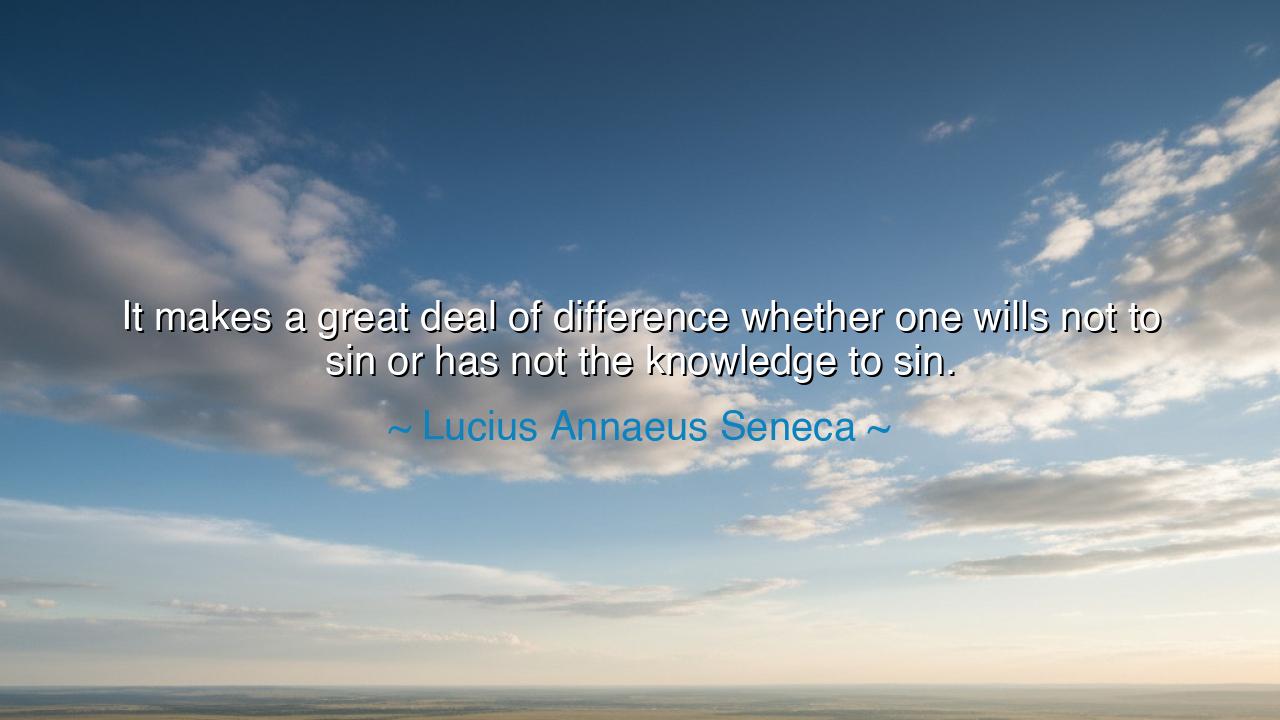
It makes a great deal of difference whether one wills not to sin
It makes a great deal of difference whether one wills not to sin or has not the knowledge to sin.






The words of Lucius Annaeus Seneca, the Stoic philosopher of Rome, pierce with the sharpness of moral insight: “It makes a great deal of difference whether one wills not to sin or has not the knowledge to sin.” In these few words, Seneca unveils a truth that lies at the very heart of human virtue—the difference between innocence born of ignorance and innocence born of wisdom. It is a distinction as vast as that between the child who does not know fire burns, and the sage who knows, yet chooses not to touch it. Seneca reminds us that the moral worth of virtue lies not in mere avoidance of wrongdoing, but in the conscious mastery of one’s will.
To understand the depth of this quote, one must know the man who spoke it. Seneca the Younger, born in Spain and raised in the might of Rome, lived in an age of corruption and decadence. He served as a tutor and later advisor to Emperor Nero, a man whose cruelty and excess would become legend. In that turbulent court, Seneca’s philosophy of Stoicism became not an idle exercise of the mind, but a shield of the soul. Surrounded by temptation, power, and peril, he understood that the highest virtue is not ignorance of evil but resistance to it. To “will not to sin” requires knowledge of the darker paths and the strength to turn away, while to “have not the knowledge to sin” is merely to wander untested through the world.
In this distinction lies one of the greatest teachings of the Stoics: that virtue is conscious, not accidental. The truly good person is not one who is good by chance or circumstance, but one who, fully aware of every alternative, chooses what is right with deliberate intent. A man who refrains from lying because he fears discovery is not virtuous—he is merely cautious. But a man who could lie, and yet does not because truth has become his law, walks in the light of wisdom. Thus, Seneca teaches that morality without understanding is no morality at all; it is the obedience of a child, not the triumph of the mind.
We see this truth reflected in every age. Consider Odysseus, the cunning hero of Homer’s epic. He was no stranger to deception or temptation; yet, when confronted by the song of the Sirens—voices that could enslave a man’s will—he ordered himself bound to the mast, choosing awareness over ignorance, restraint over blindness. His crew, with ears sealed by wax, heard nothing and sailed safely, but they did not triumph—they merely avoided danger. Odysseus alone faced temptation, knew its sweetness, and still chose endurance. He “willed not to sin,” while they “had not the knowledge to sin.” His virtue, therefore, was greater, for it was born of struggle, not of ignorance.
Seneca’s insight also reveals the architecture of moral maturity. Children and the unwise are often good because they do not know enough of the world to be otherwise. Their purity is fragile, dependent on innocence, not strength. But the mature soul, tested by passion, temptation, and despair, who still chooses the path of reason—that soul possesses true virtue. As Seneca wrote elsewhere, “No man is good by accident; virtue is something which must be learned.” To will not to sin, then, is the mark of one who has ascended from naivety to wisdom, from fear to freedom. It is the victory of consciousness over impulse.
Yet, this teaching is not meant to glorify sin or temptation, but to glorify the power of will. The Stoics did not seek ignorance of the world’s evils, but mastery over their response to them. For they believed that character is the sum of one’s choices—that the gods themselves have granted mankind the gift of reason so that he may govern himself. To live virtuously without knowledge of vice is like sailing calm seas without ever knowing the strength of the storm. But to know the tempest, to feel its pull, and yet to steer one’s ship steadily toward the shore—that is the triumph of the wise.
Let this be the lesson, then, for those who walk the path of life today: seek knowledge, but marry it to discipline. Do not boast of innocence born of ignorance; instead, strive for the serenity of one who has seen the shadow and chosen the light. The one who understands the power of hatred, yet practices forgiveness; who knows the sweetness of deceit, yet speaks the truth—such a one becomes master of his destiny. Ignorance is safety for a time, but wisdom is strength for eternity.
Thus, through the centuries, the voice of Seneca still whispers to the restless heart: virtue without awareness is fragile, but virtue with understanding is divine. The gods do not favor the naive, but the courageous—the ones who, though surrounded by darkness, walk steadfast in the knowledge of right and wrong. To will not to sin is to live as a conscious being, free and awake, guided not by fear of punishment but by the harmony of the soul. For it is in knowledge, not ignorance, that man finds the truest path to goodness—and in the mastery of his will, he becomes at last the ruler of himself.






AAdministratorAdministrator
Welcome, honored guests. Please leave a comment, we will respond soon